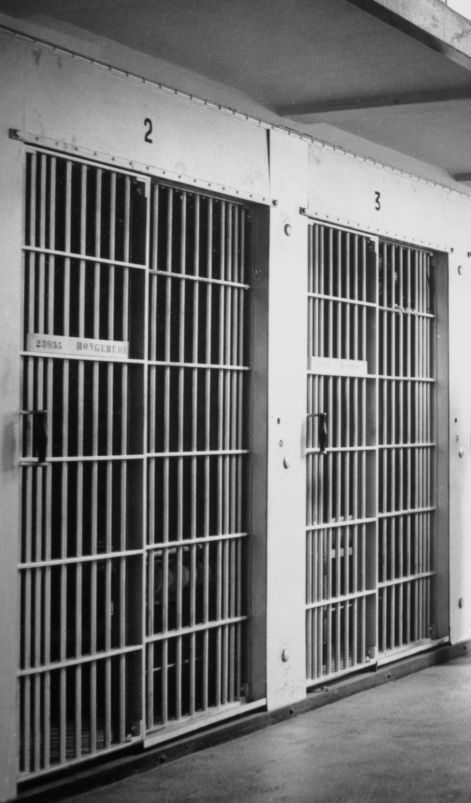
Source: Three Lions/ Iowa State Penitentiary maximum security prison in Fort Madison, Iowa, / Getty
On April 25, Melissa Lucio, the Texas mother that was sentenced for the 2008 murder of her two-year-old daughter, was scheduled to die by lethal injection. However, prosecutors stayed the execution citing that the 53-year-old may have been coerced into giving a false confession. The case is now subject to further review.
Over the last year, Lucio has gained an outpour of support from people who believe she had nothing to do with her daughter’s death and for 14-years, she’s maintained her innocence.
“I thank God for my life,” the mother of 14, said in a statement on Monday.
“I have always trusted in Him. I am grateful the Court has given me the chance to live and prove my innocence.”
Reality TV star turned carceral activist Kim Kardashian celebrated the court’s huge decision on Instagram. Kardashian has played a major role in advocating for the release of wrongfully convicted inmates like Alice Johnson, who was freed from prison in 2020 after she was found innocent of committing drug trafficking-related crimes.
“Best news ever!,” the 41-year-old reality star wrote via her Instagram Story, according to PEOPLE. “Melissa Lucio has been on death row for over 14 years for her daughter’s death which was a tragic accident. She is getting a hearing on her claims for her case & has been granted a stay of execution by the Texas Court of Criminal Appeals,” she added.
Lucio may have been coerced into pleading guilty to her daughter’s death
New details are beginning to emerge about the death of Lucio’s daughter that occurred back on Feb. 15, 2007. Lucio was charged with capital murder after a Texas court ruled that she had physically abused the young toddler to death. Prosecutors claimed that they found bruises on the child’s body upon examination, but Lucio and her defense team argued that the fatal incident was a complete accident.
As the family was moving into their new home, Lucio testified that her daughter fell down the stairs. The infant died two days later in her sleep.
In 2021, prosecutors obtained video footage from Lucio’s emotional interrogation that captured her being aggressively questioned about the incident. This week, her legal team argued that the video wasn’t shown to the court before she was convicted and sentenced in 2008.
The mother was pregnant with twins at the time of the intense session which went on for five hours on the day of her daughter’s death. The video shows interrogators interrupting Lucio, and showing her horrific photos of the deceased toddler as they pressured her into making a false confession. Although she denied killing her daughter nearly 100 times in the video, towards the end, Lucio confessed:
“I guess I did it. I’m responsible.”
Vanessa Potkin, an attorney representing Lucio from the Innocence Project argued that she may have felt pressured into making a false confession because she is a victim of abuse herself. According to Potkin, Lucio had endured sexual and physical abuse during childhood and in her rocky marriage with her daughter’s father. He was sentenced to four years in prison in connection with the alleged crime. Potkin told the publication that as a survivor of abuse Lucio learned to be “detached, to acquiesce, to not challenge as a defense mechanism,” making it easy for Texas criminal justice authorities to wrongfully convict her.
Getting Lucio off of Death Row will be a tough challenge
Severe child abuse fatalities involving children under the age of ten are often tied to life with no parole or death penalty sentences.
As the Court of Criminal Appeals of Texas gears up to re-examine the case, officials said that they will consider the autopsy evidence and the video of Lucio’s false interrogation, but it might not be enough to get her off of death row Potkin told Insider.
“Unfortunately, when it comes to wrongful convictions, I just don’t think that Texas is a standout,” she explained. “This is a problem that impacts every city, every state throughout the United States, every county. It is pervasive because the types of evidence that we use to identify, arrest, prosecute individuals is fallible.”
Potkin added:
“The truth is that once you’re convicted, it’s extraordinarily difficult to get back into court with new evidence of innocence and to get a wrongful conviction overturned,” she added.
Women are more likely to confess to crimes they did not commit
Lucio’s story is more common than most think. According to the National Registry of Exonerations, 70 percent of women who were exonerated were wrongfully convicted of a false crime. The registry notes that out of 264 female exonerees: 30 of them involved false confessions, while 135 involved perjury or false accusations. 93 of those wrongfully convicted cases were connected to misleading forensic evidence and data.


0 Commentaires